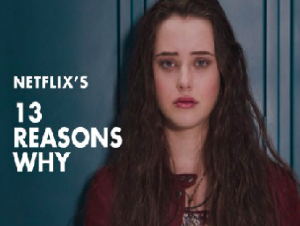Netflix’s newest original series, 13 Reasons Why, has sparked a long overdue discussion amongst teenagers, schools, and adults. The series, based on the book by Jay Asher of the same the title, is split into thirteen episodes that list the reasons for the protagonist’s, Hannah Baker, suicide. Before killing herself, Hannah leaves tapes for people whom she believes played a role in her death. The show delves into issues of rumours, bullying, and sexual assault. “It shows the growth and development of teenagers, morally, mentally, and socially,” says school nurse Anne Ravreby.
What is most striking about the show, however, is the amount of attention it received. According to Seventeen magazine, the series “has been tweeted about more than any other Netflix show in its first week of streaming.” 13 Reasons Why has drawn both praise and criticism for its depiction of mental health and suicide. Regardless of the mixed reviews, the show has prompted an important dialogue over these issues, which are not commonly vocalized by high schools.
Following the growing popularity of the show, several local schools, including Episcopal, sent notices to parents warning families of the graphic content and heavy themes. In his email, Dr. TJ Locke wrote, “In addition to suicide, the series focuses in on other heavy and sensitive topics that children may have a difficult time processing.” These issues, however, are not something that students are processing; they are experiencing them. It is upsetting that it has taken a Netflix show to get schools talking about these controversial subjects.

Junior Form Dean Holly Johnston admits, “We could do a much better job. I think that’s our biggest problem here: mental health.” With no health courses offered in the Upper School and only so many health seminars allowed, Ravreby says it is hard for her to cover all the health dangers that face high schoolers while still devoting enough time to mental health. Ravreby says, “We have a start, but we need more.”
According to suicide.org, approximately 20% of teenagers experience depression before reaching adulthood and every 100 minutes, a teen dies from suicide. These statistics alone should prompt discussions amongst schools and family. While not to discredit the importance of drug issues, according to the Newport Academy, only 1.6% of high school seniors have ever tried heroin, which has repeatedly been a focus of health seminars and school attention. In comparison, mental health and suicide is much more relevant.
“We know kids in our community who have committed suicide, and we know kids connected to members of our community who committed suicide, like the boy from Shipley last year,” says Johnston. Even with such tragedies occurring close to the Episcopal community in recent years, the school rarely addresses these issues. Mental health and sexual assault have not been the topic of school wide assemblies, and the psychologists at Episcopal are not employed full time. State government has addressed the issue, Ravreby says, “There is a state mandate that all schools have to train everyone that works in the school how to see signs and symptoms of depression. We haven’t done that yet,” for there is a grace period attached to that law. It is not clear to students how high a priority mental health is to Episcopal.
The Episcopal Academy simply just does not focus on these issues, Ravreby says,“Could we do more? Most schools could. has it been identified? Yes, the school has made an effort, there are psychologists in every unit. But I think, what more is needed, what I would like to see, is more student run initiatives saying ‘hey, we got a problem.’ I would like to see the students come up, not just blame it on the school.” These issues, however, are difficult for students to discuss for they are often stigmatized. It is the school’s responsibility to create a culture that makes these conversations not only comfortable, but commonplace.